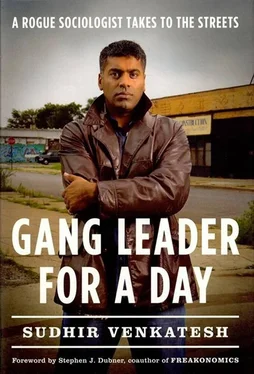But all that would take some time. My next set of answers about life in Robert Taylor came from the second-most-powerful force in my orbit, the woman known to one and all as Ms. Bailey.
FIVE. Ms. Bailey’s Neighborhood
Iran into Ms. Bailey pretty regularly. Sometimes she accompanied J.T. as he made his rounds of the building; sometimes I’d see her with a police officer or a CHA official. She always said hello and politely introduced me to whomever she was with. But I didn’t really know what she did or how she did it. Although she was present at the backroom gang negotiation I witnessed at the Boys & Girls Club, she hadn’t gotten very involved. So I was curious to learn more about her.
Specifically, I wanted to know why residents spoke of her with a mixture of reverence and fear, much as they spoke of J.T. “Oh, you don’t want to mess with Ms. Bailey,” they’d say. Or, “Yeah, Ms. Bailey can tell you a lot about what’s happening, but make sure you have five dollars with you.” Even J.T., who agreed that I should spend some time with Ms. Bailey, vaguely hinted that I ought to be careful around her.
Part of my motivation to observe Ms. Bailey came from my advisersat the University of Chicago. Jean Comaroff, an accomplished ethnographer, said that I was spending too much time with men. Since two-thirds of the community were women raising children, she suggested that I try to better understand how women managed households, secured services from the CHA, and otherwise helped families get by. Bill Wilson told me that poverty scholars knew little about the role women played in community affairs, and he encouraged me to spend time with household leaders like Ms. Mae but also tenant leaders like Ms. Bailey. Wilson and Comaroff both advised me to exercise the same sort of caution with Ms. Bailey as I would with other powerful people, never taking what they told me at face value.
Ms. Bailey was of average height and stout. Because of arthritis in her knees, she walked slowly, but always looking straight ahead with great focus, like Washington crossing the Delaware. She had a tattoo on her right arm that read MO-JO-the nickname, Ms. Mae told me, of a son who’d passed away. Ms. Bailey had pudgy fingers and, when she shook your hand, the tightest grip I’ve ever felt.
Her title was building president of the Local Advisory Council (LAC). This was an elected position that paid a part-time wage of a few hundred dollars a month. The official duties of a building president included lobbying the CHA for better building maintenance, obtaining funds for tenant activities, and so on. Elections were held every four years, and incumbents were rarely deposed. Some LAC presidents were much more powerful than others, and from what I’d heard, Ms. Bailey was on the upper end of the power scale. She had actually fought for the creation of the LAC many years ago, and she kept her fighting spirit. I’d heard stories about Ms. Bailey getting medical clinics to give free checkups to the children in her building and local stores to donate food.
I witnessed this fighting spirit firsthand when I visited her small, decrepit office one day. I wanted to explain why I’d been hanging around her building and also explain my research. I began by discussing the prevailing academic wisdom about urban poverty and the factors that contributed to it.
“You planning on talking with white people in your study?” she snapped, waving her hand at me as if she’d heard my spiel a hundred times already.
I was confused. “This is a study of the Robert Taylor Homes, and I suppose that most of the people I’ll be talking to are black. Unless there are whites who live here that I’m not aware of.”
“If I gave you only one piece of bread to eat each day and asked why you’re starving, what would you say?”
I was thrown off by this seeming non sequitur. I thought for a minute. “I guess I would say I’m starving because I’m not eating enough,” I answered.
“You got a lot to learn, Mr. Professor,” she said. “Again, if I gave you one piece of bread to eat each day and asked why you’re starving, what would you say?”
I was getting even more confused. I took a chance. “Because you’re not feeding me?”
“Yes! Very good!”
I felt relieved. I hoped no more tests were coming my way, but Ms. Bailey kept going. “Let’s say I took away your house key and you had to sleep outside,” she said. “A man from the city comes over and counts you as ‘homeless.’ What would you say?”
“Umm.” This one seemed even harder. “I’d say you’re wrong. I have a place to stay, so… no! I’m not homeless!” I thought I had nailed this one.
But she looked exasperated at my answer. “Wow, have you ever had to do anything for yourself?” she said.
I was at least smart enough to know that she wasn’t literally asking me to reply.
“If I took your house key away,” she barked, “what does that make you?” She leaned across the desk, and I could feel her breath on my face.
“Well, I guess you robbed me. So I’m not homeless, I’m a victim.”
“Okay, we’re getting somewhere. Now let’s say I tell the police to stop coming to your block and to go only where I live. And then I write that you live in a crime-infested neighborhood, that there’s more crime on your block than mine. What would you say?”
“Well, I guess I’d say that it’s not really fair because you have all the police, so-”
“Mr. Professor, we’re really getting moving now!” Ms. Bailey threw up her hands in mock celebration. “Okay, so let’s go back to the original question. You want to understand how black folks live in the projects. Why we are poor. Why we have so much crime. Why we can’t feed our families. Why our kids can’t get work when they grow up. So will you be studying white people?”
“Yes,” I said. I understood, finally, that she also wanted me to focus on the people outside Robert Taylor who determined how the tenants lived day to day.
“But don’t make us the victim,” she said. “We’ll take responsibility for what we can control. It’s just that not everything is in our hands.”
Our subsequent meetings were much the same. I would walk in to discuss an issue-the 60 percent dropout rate, for instance, among the project’s high-school kids. “Research today says that if kids can get through high school, they have a twenty-five percent greater likelihood of escaping poverty,” I said, as if giving a lecture. “So early education-keeping them in school-is the key. Also-”
Ms. Bailey interrupted. “If your family is starving and I tell you that I’ll give you a chance to make some money, what are you going to do?”
“Make the money. I have to help my family.”
“But what about school?” she said.
“I guess it will have to wait.”
“Until what?”
“Until my family gets enough to eat.”
“But you should stay in school, right?” she said, sarcasm rising in her voice. “That’s what will help you leave poverty.” She paused. Then she smiled triumphantly and made no effort to hide her patronizing tone. “So… you said you wanted to talk with me about high-school dropouts?”
It took a while, but I eventually realized there was no point in trying to act even remotely authoritative around Ms. Bailey. There was part of me that felt like the expert researcher, but only a very small part. Once I learned that there was no way around Ms. Bailey’s Socratic browbeating, I decided to give in and just let her teach me.
I usually dropped by her office during the hours she reserved for open visitation from tenants; otherwise it could be hard to track her down. When a tenant came by, Ms. Bailey would ask me to step out. Our longest conversations, therefore, rarely lasted beyond fifteen minutes. Ms. Bailey remained formal with me, as if she were keeping her guard up. She never shared details about specific tenants; instead she spoke in generalities about “families who live around here.”
Читать дальше












